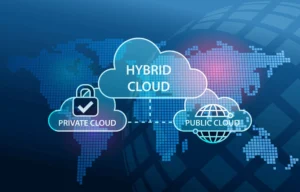PUBLIC & PRIVATE CLOUD
Secure high availability IaaS. Quickly scalable computing resources for any workloads
The Cloud is computing as a service, encompassing apps, storage and the underlying hardware, all delivered via the internet. So, as long as you’re connected to the Web, you have full access to your entire working environment.
Public Cloud

Public Cloud is a cloud computing service offered by various technology companies. It provides scalable, high-performing network services and resources to organizations. Public clouds can be used for many different purposes, such as:
- Hosting applications and websites
- Storing large amounts of data in virtualized databases or files on a remote server that can be accessed over the internet with any device or browser (often referred to as “cloud storage”)
- Creating and maintaining highly flexible IT infrastructures that scale up or down based on business needs without requiring capital investment in physical servers or other hardware components (also known as “infrastructure as a service”)
Though public cloud offerings are often compared to private clouds (clouds that are built and managed internally by an organization), there are several key differences between the two. Public clouds are typically much larger in scale, with more users and more data than private clouds. They also tend to be more diverse, with a wider range of applications and workloads running on them. Finally, public clouds are usually less expensive than private clouds, since they can take advantage of economies of scale.
Overall, public cloud computing is a powerful tool that can help businesses of all sizes achieve greater efficiency, agility, and cost savings. If you’re considering using a public cloud for your organization, do your research to find the right provider and plan that meets your needs.
The main benefits of public cloud computing include:
Reduced costs
Public clouds can be very cost-effective, since you only pay for the resources you use and there is no need to invest in costly hardware or software up front.
Increased flexibility and agility
Public clouds make it easy to scale up or down as your needs change, without any disruption to your operations.
Private Cloud
Technotrust Solutions offers private cloud computing services that can be tailor-made to the specific needs of our clients. We understand that not all businesses have the same requirements when it comes to their cloud infrastructure and we are committed to providing a service that is flexible and scalable.
Our private cloud services can be deployed on-premises or in a hybrid environment, giving you the flexibility to choose the most appropriate solution for your business. We can also provide a managed service option, where we will take care of all the technical details for you.
If you are looking for a private cloud solution that is reliable, secure and cost-effective, then please get in touch with us today. We would be happy to discuss your specific needs and find the right solution for you.

The main benefits of public cloud computing include:
Scalability
Another significant benefit of public cloud is its scalability. Public clouds are designed to be highly scalable, so businesses can easily add or remove resources as needed.
Improved Security
Despite some initial concerns, public clouds are now generally considered more secure than on-premise infrastructures.
Hybrid Cloud
A hybrid cloud is a mix of private and public clouds that share the same infrastructure. Hybrid Cloud also provides an extra layer of security by separating sensitive data and applications from public access.
With the growing popularity of cloud computing, hybrid clouds are becoming more common as businesses look to take advantage of the benefits of both public and private cloud environments.
There are a number of reasons why businesses choose to use a hybrid cloud solution. For example, some companies want to store their sensitive data in a more secure environment, while still being able to access those same applications from anywhere.

The main benefits of Hybrid cloud computing include:
Scalability
A primary obstacle posed by a private network is the expense involved in establishing, maintaining, and expanding your infrastructure. Before cloud services were available, a company had to wait until it had significant funds—enough to purchase new physical machines—before it could add to their IT system.
Improved Security
If you make use of a hybrid cloud infrastructure, your organization can take advantage of the security that comes with a private cloud, as well as the power and options that typically come with public clouds.
Cost
A primary obstacle posed by a private network is the expense involved in establishing, maintaining, and expanding your infrastructure. Before cloud services were available, a company had to wait until it had significant funds—enough to purchase new physical machines—before it could add to their IT system.
Speed
Another advantage of maintaining control over your network resources is enhanced speed. While a hybrid cloud environment is not, by itself, quicker than a public or multi-cloud setup, it allows IT teams to optimize the network in ways that reduce latency and simplify the data transfer process.
Other Features
Others may be looking for cost-effective ways to quickly deploy new applications or services without having to worry about maintaining on-premise infrastructure. Whatever the reason, using a hybrid cloud solution provides many benefits for businesses of all sizes.
If you’re thinking about implementing a hybrid cloud solution for your business, there are several key considerations that you need to keep in mind. First, you need to decide which type of hybrid cloud model is right for you. There are three main types of hybrid clouds: public-private, private-public, and hybrid IT.
Second, you need to select the right mix of public and private cloud services that will meet your business needs. This can be a challenge, as there are a wide variety of cloud services available from different providers.
Third, you need to ensure that your data is properly protected when it’s stored in the cloud. This includes ensuring that your data is encrypted and backed up in multiple locations.
Finally, you need to have a plan in place for how you’re going to manage and monitor your hybrid cloud environment. This includes setting up proper security and governance policies.
By following these steps, you can ensure that your hybrid cloud implementation is successful.
Though public cloud offerings are often compared to private clouds (clouds that are built and managed internally by an organization), there are several key differences between the two. Public clouds are typically much larger in scale, with more users and more data than private clouds. They also tend to be more diverse, with a wider range of applications and workloads running on them. Finally, public clouds are usually less expensive than private clouds, since they can take advantage of economies of scale.
If you are looking for a reliable and experienced provider of Hybrid cloud computing services, look no further than Technotrust Solutions. Contact us today to learn more about our managed services and how we can help your business improve its productivity!


